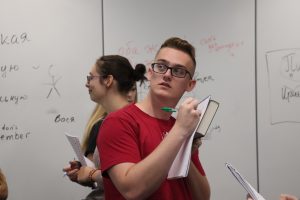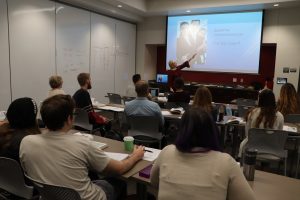Happy day 3 of STARTALK!
By the third day, beginners have mastered multiple phrases, like “я живу во Флориде” and “очень приятно,” that are useful both in daily conversations and business setting. Intermediate students are comfortable with longer conversations on topics of hobbies and navigating the airport. Classrooms are filled with Russian chatter and laughter. Have a look at how well Ahmed and JP, two beginner students, introduce themselves to each other:
So what kind of wild beast is Russian? Let’s look at some facts! The Russian language is the 8th most widely spoken language in the world with 155 million native speakers and 105 million language learners (yes, you are one of them!). The language is related to Belarusian and Ukranian, so knowing Russian will help you communicate with people from several Eastern European countries.

Alex (intermediate group) learning new hobby-related words
Many participants loved салат Оливье and борщ. Both of these dishes have картофель (potato) in them. But did you know that the word “картофель” was borrowed from German? Russian vocabulary expanded greatly during Peter the Great’s Westernization. The language, however, did not only borrow foreign words but also loaned some to other languages. You have probably heard of cosmonaut and sputnik; both of them originated as Russian words.

Beginner group learning greetings
Russian is listed as a category IV language by the American Foreign Service Institute (FSI), the second most difficult category for English speakers. Some believe it should be category V, the most difficult (which includes Chinese and Arabic). You, too, might find it challenging, but don’t be discouraged! Our talented team of instructors is eager to help you out.
What do you find to be the most challenging when learning Russian? Leave a comment below or on our social media using #STARTALK_UCF_2019
Twitter: @StartalkUCF2019
Instagram: @STARTALKUCF
Facebook: STARTALK UCF 2019